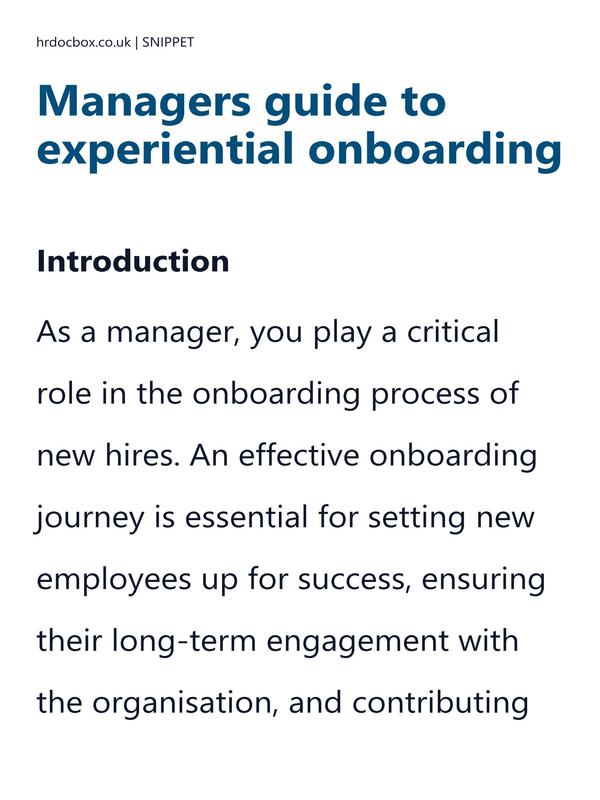Managers guide to experiential onboarding


Our Guide to Experiential Onboarding for Managers offers a comprehensive approach, providing managers with strategies to create immersive and engaging onboarding experiences for new hires, fostering better integration and productivity.
- Includes 12 months' access to the Managers guide to experiential onboarding, with all updates provided free of charge and notified to you.
- UK-specific accuracy.
- 697 words over 2 pages.
- Last updated 08/03/2025.
- Format: Word / PDF / plain text / email.
- Delivery: Instant download after purchase (no physical item).
- Access: Download link shown here after checkout.
- This Managers guide to experiential onboarding will SAVE you up to 1 hour 30 mins research, save you money, and reduce your risk.
Managers guide to experiential onboarding
Introduction
As a manager, you play a critical role in the onboarding process of new hires. An effective onboarding journey is essential for setting new employees up for success, ensuring their long-term engagement with the organisation, and contributing to their overall growth and development. While traditional onboarding methods often focus on paperwork and presentations, an experiential onboarding journey provides hands-on learning opportunities that foster a deeper understanding of the company's culture, values, and operations. This guide outlines a comprehensive approach to experiential onboarding, emphasising practical learning and integration through job shadowing, team projects, and mentorship pairings. By implementing these strategies, you can play a pivotal role in creating a positive and impactful onboarding experience for your team members.
Key Elements of an Experiential Onboarding Journey
-
Establish Clear Onboarding Goals: Work with your HR team to define clear and measurable goals for the onboarding process, aligning them with the organisation's overall objectives. Determine what success looks like for new hires in your department and how their onboarding experience will contribute to their long-term growth and contribution.
-
Provide a Structured Orientation: Collaborate with the onboarding team to provide a structured orientation that introduces new hires to the company's history, mission, values,
This is a 30% preview of the Managers guide to experiential onboarding. For instant full access, purchase this item or a parent bundle.
Managers guide to experiential onboarding purpose
The Guide to Experiential Onboarding for Managers is a comprehensive resource designed to equip managers with effective strategies and tools to enhance the onboarding experience for new hires. It provides a structured approach focusing on hands-on, immersive techniques that enable managers to create engaging and informative onboarding journeys for new employees. This guide offers insights into understanding the unique needs of new hires, facilitating their integration into the company culture, and fostering productive relationships within teams.
By utilising the strategies outlined in this guide, managers can leverage experiential onboarding methods to create impactful and personalised experiences for new team members. The guide encourages managers to go beyond traditional approaches by incorporating interactive activities, mentorship programmes, and team-based initiatives that align new employees with the organisation's values, goals, and workflow. Additionally, it empowers managers to establish effective communication channels, set clear expectations, and provide ongoing support to ensure a successful and engaging onboarding process.
In summary, the "Guide to Experiential Onboarding for Managers" equips managers with the necessary insights and tools to orchestrate immersive and engaging onboarding experiences. It enables them to nurture a welcoming environment, accelerate new hire integration, and cultivate a sense of belonging, ultimately contributing to enhanced employee satisfaction, productivity, and retention within the organisation.
Frequently Asked Questions about a Managers guide to experiential onboarding
Frequently Asked Questions about a Managers guide to experiential onboarding
-
Can I use the Managers guide to experiential onboarding in my small business?
Yes. The Managers guide to experiential onboarding is designed to be flexible and suitable for organisations of all sizes, including small businesses and charities. It follows UK employment law best practice, so even if you don't have an in-house HR team, you can confidently apply it.
-
Is the Managers guide to experiential onboarding compliant with 2026 UK employment law?
Absolutely. Like the Managers guide to experiential onboarding, all of our templates are drafted with the latest ACAS guidance and UK employment legislation in mind. We review and update them regularly, so you can be confident they remain compliant.
-
Can I customise the Managers guide to experiential onboarding for my organisation?
Yes, we highlight the areas of the Managers guide to experiential onboarding that you need to update with your own details, and where you need to make decisions to suit your situation. This saves you time and ensures that you meet best practice.
-
Do I get instant access to the Managers guide to experiential onboarding?
Yes. Once purchased, you'll be able to download the Managers guide to experiential onboarding instantly. Templates are provided in editable Word or Excel format so you can customise them easily, and in PDF format for easy sharing.
-
What if I need more help, not just a Managers guide to experiential onboarding?
If you're looking for broader support, we also offer toolkits and library bundles that include the Managers guide to experiential onboarding, along with other HR templates and policies for fully managing your situation. These may be more cost-effective if you need deeper advice.
-
Why should I use this Managers guide to experiential onboarding, and not AI to generate it?
The risk of using a free AI-generated template 'without review' includes your legal exposure, missing context, and no awareness of the wider process, whereas purchasing the Managers guide to experiential onboarding from us mitigates that risk.
